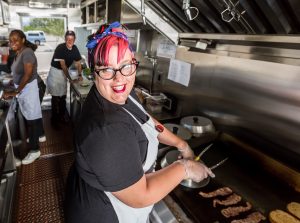If you love making food just as much as eating it, then starting a small food business might be a good prospect. You can start it anywhere, anytime, and it’s a great avenue to hone your skills without having to worry about losing a huge investment as opposed to building a brick-and-mortar diner.
Are you wondering where to begin? Jump-start your flavourful food adventure with these suggestions:
1. Food truck
If you’re passionate about bringing your unique flavor to as many hungry customers as possible, then being mobile is vital. Look at mobile food trucks for sale in New Zealand and see which one fits your food concept best. These food trucks are cost-efficient for food businesses because they usually require a lower initial investment and fewer operational costs. Often, a few pieces of necessary kitchen equipment come with the mobile vehicle, too.
The hype around food trucks doesn’t seem to have died down yet. In a way, a roving food truck is it’s own guerrilla marketing and can build its brand whenever, wherever.
2. Meal delivery service
Another food business option you can pursue is a meal delivery service. People rarely have the time to go grocery shopping and to prepare their meals, so they hire a meal delivery service. That’s where you come in. The benefit of this type of business is that you work from home and cook at specific hours – whether on a weekly or monthly basis.
However, most patrons of meal delivery services are health-conscious and seek meal plans that have precise calorie counts or specific ingredients. You can seek the advice of licensed nutritionists or dieticians to curate your weekly menu better.
3. Catering service
While it can require more significant capital to take off, starting your catering service is a viable food business once you start getting clients consistently. Don’t fret about your return of investments, though, because more often than not, your clients will be corporate entities and big-shot business owners planning for large-scale affairs.
If you’re planning to be a private caterer, you need an excellent menu, an ample set of tableware for up to a hundred diners, dependable staff, and a service vehicle.

4. Special events
Special events where you can exhibit your cooking expertise can be anything – from Sunday markets to state fairs to music festivals. Everywhere where there is enough space for lease is an opportunity to share your cuisine.
This might be where your networking skills will be most relevant. If you want to earn a spot in one of these public events, you’ll have to put your brand out there. Use social media to reach out to event coordinators and producers, and research about upcoming fairs, festivals, block parties, bazaars, and anything similar within your area.
5. Neighborhood diner
You should never underestimate the likelihood of opening your small restaurant in your area. Whether it’s a little pub or a hole-in-a-wall burger joint at the corner of your street, it’s still your own.
Aside from securing lease and business operating permits, you need to secure hardware for your small storefront. Going the traditional way, you might experience off-days and no-shows. Nonetheless, if you focus on your menu, you will eventually gain a loyal following, which can carry your brand further.
If all else fails, explore the idea of starting a small cooking class. Ultimately, it’s the love of food that drives you, and nothing feels better than sharing this love with others, whether you’re cooking for them or teaching them how to cook.

